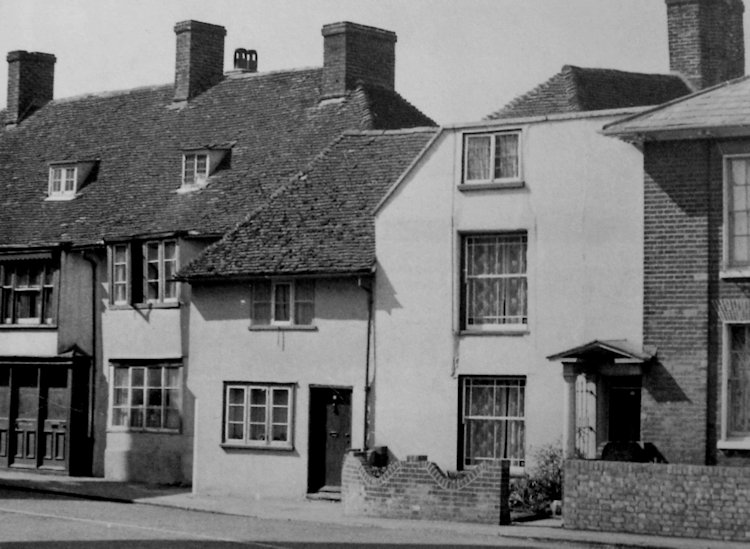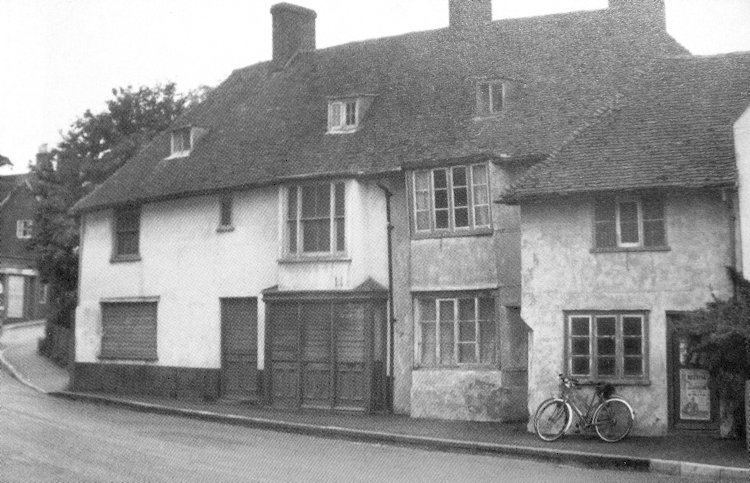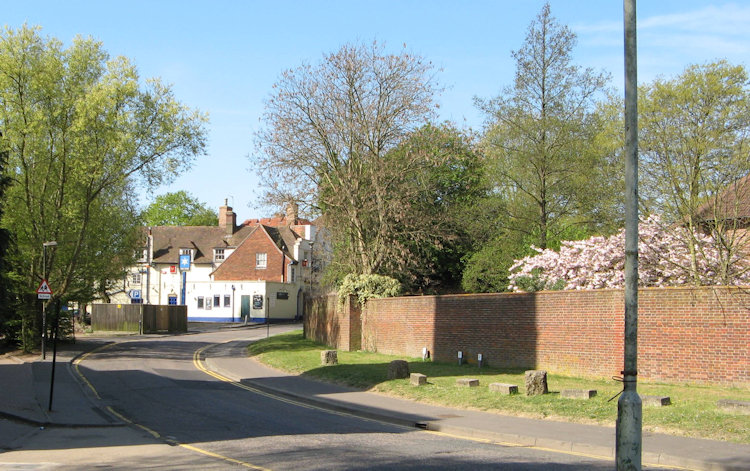|
17 East Hill / Bridge Street 1851
Ashford

Above photo, date unknown, kindly sent by Christopher Green. |

Above photo, date unknown, kindly sent by Christopher Green. |

Above photo, 22 April 2007, by Jim Ashby. |
Richard Thackery tells me that the pub although closed many years before
this was probably demolished just prior to the widening of Mace Lane
in the early 1970s.
|
Southeastern Gazette, 13 September 1853.
Applications for Licenses.
The applications of Mr. Wenbourne, for a transfer of his license to
a new house near the railway station, of Mr. Richard Ford, landlord
of the "Queen’s Head," and of Mr. Edward Arkhurst, for a newly
erected house, were granted. (I don't know
which house the latter was yet. Paul Skelton.)
|
|
From the Kentish Gazette, 7 February 1865.
Petty Sessions, Tuesday. Before G. E. Saver, Esq., and Major Groves.
Felony.
George Pagett and John Brett were charged with staling a coat from
the taproom of the "Queen’s Head," Ashford, the property of Edward
Gilbert, the ostler. It appeared that on Thursday evening, the 25th
of January, the two prisoners and another man, with whom they were
in company, were drinking with several other persons at the "Queen’s
Head," and the ostler's coat was lying in a chair. The prisoners
wanted a woman who was present to sell it for them, but she refused
to do so. All three of the men slept at the "Queen’s Head" that
night, and the next morning they were seen to take the coat from out
of a dung heap in the stable yard and go away with it. They
afterwards sold it at Brabourne. The third man was not apprehended.
The prisoner Pagett defended himself with some ingenuity; but both
he and Brett were convicted, and sentenced to one month’s hard
labour each.
|
|
From the Kentish Gazette, 9 May 1865.
Petty Sessions. Saturday. (Before G. E. Sayor, Esq., Captain
Billington, Major Groves, and E. H. K. Hugessen, Esq., M. P.)
The Results of Intemperance.
A respectably dressed man, named Edward Hardener, a tin-plate
worker at Brabourne, pleaded "not guilty" to a charge of stealing a
pewter beer measure, valued 3s. 6d., from the "Duke
of Marlborough Inn," Ashford.
Ellen Hopper, wife of Stephen Hopper, landlord of the "Duke
of Marlborough," deposed that the prisoner come into her house
on Wednesday evening, and called for a pint of beer, which she
served him in the pewter measure produced. Shortly afterwards she
was told by Mr. Rose, of the "Royal
Oak Inn," that a man had gone up the street from her house with
a pewter pot, and she then found that the prisoner had slipped out
of the house without her noticing him.
Edwin Rose, landlord of the "Royal
Oak," deposed that he was standing at his door, when he saw the
prisoner on the opposite side of the road, drinking from a pewter
pot. Prisoner threw the remainder under of the contents away, put
the pot in his pocket, and walked off.
Police-constable Frank Quested deposed that from information he
received he apprehended the prisoner in High Steet, and found the
pot produced in his coat pocket. Prisoner said he had it from the "Queen’s
Head."
The prisoner, in defence, said he was so tipsy he did not know
what he was doing, he had no intention of stealing the pot.
In answer to the Bench, Mrs. Hopper said the prisoner was drunk;
she did not desire to press the charge.
Mr. R. Rabson gave the prisoner a character. He was quite the
reverse of dishonest; but had an unfortunate weakness for drink.
The Bench ordered the prisoner to be imprisoned until the rising
of the Court, and cautioned Mrs. Hopper not to serve drunken men
again.
|
|
From the Kentish Gazette, 9 May 1865.
Wild Sports Of Ashford.
A man named James Pilcher, formerly in the Cape Mounted Rifles,
and who had his arm in a sling, was charged with assaulting a young
man named John Head.
Complainant deposed that he came out of the "Queen's Head"
public-house a little before 12 o’clock on the previous Saturday
night, and there was a little hit of a "set to" outside. Some one
gave him a bottle to hold, and when he gave the bottle back, the
defendant suddenly struck him several violent blows on the head. He
was also maltreated by a number of the defendant’s companions.
Defendant said he was persuading an old man, who was being
ill-treated, to go home, when complainant swore at him, and asked
him what he had to do with it. He admitted that he then struck the
complainant.
Pilcher was further charged with assaulting John Breeds. Breeds
deposed that he remonstrated with Pilcher for striking Head in the
manner he was doing, when some of defendant's companions called out,
"Let the ----- have it," and defendant struck him in the eye. He was
knocked down, and kicked severely while on the ground by the other
men, and dragged along by the hair of his head.
Pilcher said that Breeds pulled off his jacket to fight, and it
seemed the complainant did do so, but he alleged it was after he was
assaulted.
Superintendent Dewar, who was sent for by the landlord of the
"Queen’s Head," it being feared that the man Breeds would be
seriously injured by the savage violence of his assailants, stated
that when he arrived the parties complained of had decamped, leaving
Head and Breeds and his wile terribly knocked about. They were each
of them sober. The man Breeds had been severely kicked on the head
and arms, and it was stated he had been dragged along the ground by
his hair. The defendant, and ten or a dozen more rough fellows with
whom he was connected, made it a practice to kick up rows at public
houses, and one of them would pick a quarrel with some one who was
alone and then the whole of them would knock him about. There were
several such cases against them, but the parties assaulted had not
prosecuted.
Before the Bench adjudicated on the cases, a companion of the
defendant on the night in question, was charged with assaulting the
wife of Breeds. His name was John Hills, and he was a great,
ill-looking fellow, displaying a severe black eve and cuts about his
face. In answer to the Bench he said he had received these scars in
"another affair," since the one for which he was brought up.
Hannah Breeds deposed that when her husband was knocked down
several of the men kicked him. Hills was going to do so but she said
he should not, and placed herself between him and her husband. Hills
then struck her a blow with his fist, and also kicked her on the
arm, and on other parts of her person.
Hills said that the complainant was worse than her husband, and
"egged" him on to fight.
The Bench fined Pilcher 30s. for the two assaults, and Hills
20s., or in default 14 days hard labour. The fines were paid.
|
|
Canterbury Journal, Kentish Times and Farmers' Gazette 9 September 1865.
LICENSING DAY.
The licenses of the public houses in the Ashford division were renewed. The
following new licenses were applied for:— ....
Amos Walder, of the "Sun" beershop, New-rents, Ashford, was the next
applicant, and Albert Lindfield, of the "Star" beershop, East Hill, Ashford,
also applied for a license for his house. This was opposed by Mr. Langham on
behalf of Mr. Butcher, of the "Queen's Head Inn," and the solicitor produced
a memorial against it from several highly respectable inhabitants living in
the neighbourhood of the "Star," who complained of the way in which the
house was conducted and the class of persons using it. The Bench retired to consider the applications, and on returning into Court
announced that they had decided to refuse all of them with the exception of
that for the "Man of Kent." Ashford, kept by William Richard Brown, and for
that house they had decided to grant a license. |
|
From the Southeastern Gazette, 6 February 1866.
Magisterial Business, Monday. (Before W. P. Burra,
Esq.)
A respectably-dressed young man, named Jacobs, by
trade a blacksmith, was brought up on a charge of robbing a gentleman
staying at Ashford of a gold chain and locket, a purse containing about
15s., and other articles. The complainant, Theophilus John Holes, by his
own evidence, was very drunk on the evening of Friday, and met the
prisoner in the street while in that state. He knew he had chain,
locket, and purse safe about five o’clock, but he did not appear to know
much further what took place until the next morning, when he found
himself in bed at the “Queen’s Head Inn,” and all his property gone. It
appeared from other evidence that the prisoner brought Mr. Holes to the
“Queen's Head,” about eleven o'clock, and engaged a bed for them both,
and that he took the complainant upstairs, and came down in twenty
minutes and went out, saying he would return in a short time. He did not
come back, but it was shown that he went to the “Fountain,” and treated
a prostitute, named Harriet Watson, with brandy, flourishing a purse of,
money, and displaying a gold chain. He was drinking afterwards with the
same woman at the “British Flag,” and appeared to be intoxicated. He
wanted the landlord to buy the chain and locket, but this was declined.
Afterwards he went to the house of Watson, and she, with another
notorious character called “Blackey Top,” it seemed, plundered him of
all he had about him, and then threw him out of doors. The locket and
chain had not been found.
The prisoner, in defense, said Mr. Holes gave him
the articles to take care of.
The magistrate dismissed the ease, observing that
no jury would convict upon the evidence, and that the affair was most
discreditable to Mr. Holes.
|
|
From the Whitstable Times and Herne Bay Herald. 30 November 1867. Price 1d.
PETTY SESSIONS.
(Before G. E. Sayer, Esq., chairman, Colonel Groves, W. D. Walker, H. B.
Walker, and H. Darrell, Esqrs.) George Hayward, of Willesborough, shoemaker, was charged with stealing a
shawl, Value 8s, from the tap-room of the “Queen's Head Hotel,” Ashford. Mary Pearce, wife of George Pearce, a traveller, deposed that on the
afternoon of November 12th she was in the tap-room, and placed her shawl
on a form. When she got up to go she found it was gone. She had not seen
it since. John Valgar, of Smeeth, deposed that he saw the prisoner take the shawl
from the form and put it in his pocket. The magistrates adjourned the case for further evidence, bail being
taken. |
|
Kentish Gazette, 29 March, 1870.
Inquest.
On Thursday Afternoon an inquest was held at the "Queen's Head Inn,"
Mill Bridge, before Walter Furley, Esq., deputy coroner for East
Kent, on the body of James Moss Hobday, a man aged sixty, who was
found dead in bed under the following circumstances:-
William Dodd, landlord of the "Queen's Head," denoted:- The deceased
came to lodge at my house on Saturday evening last. I have known him
for twenty years past. He formerly lived at Boughton Lees, and was
mailman to his father, who was a brewer there. He was then in a
comfortable position in life; but for some time he has been in bad
circumstances. Two other men occupied the same bedroom in my house
as the deceased. I have not heard of any squabbling having occurred
between them. The deceased was not cheerful; the first night he came
he complained of being very unwell, but did not say in what way he
was unwell. He had no meals in my house; he generally came home
early in the evening; had a pint of beer and a biscuit, and went to
bed he told me he had been employed at the "Duke of Marlborough
Inn," but had been paid off from there the week before. On Tuesday
evening he had his pint of beer and biscuit as usual, and I saw no
more of him. I called the other two men up at halt-past five o'clock
the next morning, and they went to their work. Not seeing anything
of the deceased, I went to the room about half-past nine o’clock,
and found him lying in bed quite dead. One arm was out of the bed,
and he seemed to have died without pain or struggle, us the clothes
were not in any disorder. I found the phial bottle produced under
his bolster. It was empty and corked. There was no label on it.
Dr. George Wilks deposed:- From instructions received, I made a post
mortem examination of the body this morning. There were no marks of
violence on it. I suspected the cause of death, but I deferred
forming an opinion till I examined the bottle produced. I found it
contained minute crystals of oxalic acid, and I have no doubt death
resulted from taking that poison. It is never used as a medicine,
and could not have been taken for the purpose of curing disease or
alleviating pain. I am of opinion that a very large quantity was
taken, from the quiet mode in which death had occurred. When taken
in a very large quantity the person usually faints; but when in a
small quantity intent pain is suffered. Oxalic acid can only be sold
under the usual restrictions for the sale of poisons; and it is
usually bought in a crystallized form.
Mr. Beken, one of the jury, stated it was frequently bought in that
way and mixed with water to clean brass, harnesses, and boot lops.
William Fisher, labourer, deposed:- I and another man slept in the
same bedroom as the deceased. On Monday evening, about nine o'clock,
as the deceased was undressing to get into bed he suddenly put his
hand to his right side and exclaimed "Bless me what a pain I have
here." I said "Sit down, my good man, on the bed," He did so, and
attempted to get his trousers off but could not. I advised him to
wait till he felt better, and he did so. In a few minutes he
undressed and got into bed. I asked him how he felt, and he replied,
"All right; good night." On Tuesday night about half-past eight
o'clock he said he did not feel quite right and should go to bed. I
came up into the room about half-past nine, and I asked him how he
was. He replied, "Pretty middling," and began complaining of the
hardness of the times; he said he could not get work, and he did not
like to beg. I wanted to go to sleep, and bade him good night.
During the night I was awakened by a loud gurgling noise which the
deceased was making. I told my fellow lodger that it was hardly like
snoring, and that if it continued I should go and wake the deceased
up. ln a minute or two all was quiet, and I went to sleep again. In
the morning I went out without noticing the deceased.
William Crump, labourer, the other lodger, gave similar evidence;
and added he did not think much of the noise in the night, as the
deceased was in the habit of snoring loudly.
P.O. Hollands said that no money was found on the deceased; he had
two pawn tickets for clothes pledged by him.
The jury returned a verdict to the effect that deceased killed
himself by taking oxalic acid when in an unsound state of mind.
|
LICENSEE LIST
FOORD Richard 1851-58+ (age 71 in 1851 ) )
FOORD Mary Ann Mrs 1862+
BUTCHER Mr 1865+
DODD William 1870-91+ (also coal merchant age 43 in 1871 ) )
DODD Henry 1901-03+ (age 49 in 1901 ) )

HARRISON Arthur 1913-30+
NEWALL Albert E 1938+
https://pubwiki.co.uk/QueensHead.shtml
http://www.closedpubs.co.uk/queenshead.html
 From the Kelly's Directory 1903 From the Kelly's Directory 1903
 Census Census
|


